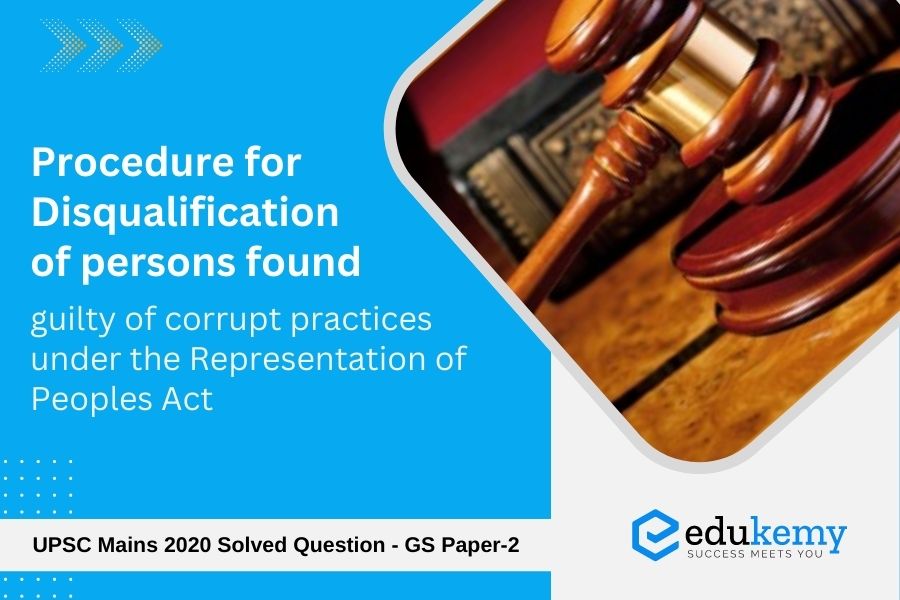The call for the simplification of procedure for disqualifying individuals found guilty of corrupt practices under the Representation of Peoples Act is imperative in fostering a more transparent and accountable political landscape. The current intricacies surrounding the disqualification process can often lead to delays and legal complexities, hindering the swift and effective removal of tainted individuals from public office. Simplifying these procedures would not only expedite the resolution of corruption cases but also serve as a deterrent for potential wrongdoers. By streamlining the disqualification process, the legal system can better uphold the integrity of democratic institutions, ensuring that those engaged in corrupt practices are promptly held accountable, thereby promoting a more robust and trustworthy electoral system.
UPSC Mains General Studies Paper – 2 Mains 2020
Salient features of the Representation of People’s Act
UPSC Mains Civil Services IAS Exam Question Paper – 2020
Contents
- 1 Structure of the Question
- 2 Answer
- 3 Conclusion
- 4 Frequently Asked Questions (FAQs)
- 4.1 1. Why is there a perceived need for simplification of procedures for disqualification under the Representation of Peoples Act for individuals found guilty of corrupt practices?
- 4.2 2. How does the current procedure for disqualification of individuals found guilty of corrupt practices pose challenges to the electoral system?
- 4.3 3. What are the potential advantages of simplifying the disqualification process under the Representation of Peoples Act?
- 4.4 4. How can the simplification of procedures ensure a fair and impartial disqualification process?
- 4.5 5. Are there successful examples of simplified disqualification procedures in other jurisdictions, and what lessons can be learned from them?
Structure of the Question
- In Introduction,
- Try to mention the election’s scenario in India.
- In Body,
- Discuss RPA and its Key Provisions.
- RPA Provisions for Disqualification on Account of Corrupt Practices.
- Challenges leading to the need for simplification.
- Try to conclude with a way forward to strengthen the ECI.
Answer
Introduction
Elections are a very potent and periodic tool at the hands of Indian citizens to hold the government accountable. Yet this is marred with many issues like criminalization of politics, polarization for vote banks, etc. The Representation of the Peoples Act (RPA), 1951 deals with the conduct of elections to the parliament and state legislatures. It also covers the qualifications and disqualifications for the membership of these Houses, the corrupt practices, and other election offenses.
Section 123 of the Representation of People’s Act,1951 provides for disqualification on the grounds of corrupt practices like:
- Bribery i.e. any gift/offer/promise or gratification to any person as a motive or reward.
- Undue influence i.e. any direct or indirect interference on the part of the candidate with the free exercise of any electoral right.
- Publication by a candidate is any statement of fact that is false.
- Promotion of feelings of enmity or hatred between different classes of citizens.
- The incurring of expenditure is more than the stipulated limit.
Procedure of Disqualification under RPA
- The procedure of disqualification under corrupt practices can be started only after the election is over and only in an election petition submitted in the State High Court by the provisions of Article 329 of the Constitution.
- Section 8 (3) of the Act states that if an MP or MLA is convicted for any other crime and is sent to jail for 2 years or more, he/she will be disqualified for 6 years from the time of release.
- Despite such an elaborate classification of corrupt practices that could potentially nullify the election of a candidate, electoral malpractice continues to flourish.
Simplification will involve
Special Election Benches:
The Law Commission of India in the 254th Report has recommended Special Courts be set up at the level of the High Courts (with direct appeal to the Supreme Court) to assess the legality of charges framed against potential candidates and dispose of the cases in a strict time frame.
Stringent application of Section 125A:
The Commission recommended that the punishment under Section 125A of RPA must be made more stringent by providing for imprisonment of a minimum term of two years and by doing away with the alternative clause for fine. Additionally, conviction under Section 125A RPA should be made a part of Section 8(1)(i) of the Representation of People Act, 1950.
Expanding Scope of Section 8:
Second ARC recommended that Section 8 of RPA needed to be amended to disqualify all persons facing charges related to grave and heinous offenses (viz. murder, abduction, rape, etc.) and corruption, where charges have been framed six months before the election.
False Affidavit Filing:
Second ARC also supported the proposal of including filing of false affidavits as an electoral offence under Section 31 of Representation of the People Act, 1950 as recommended by the Election Commission in the year 1998.
Conclusion
Revising the list of corrupt practices, and taking prompt actions accordingly fast-tracked using setting up special courts, amending IPC and the RP Act further would not let those who make the law break it. A law is effective when its understanding reaches the common among commoners. If RPA is made sufficiently simpler and elaborates on the processes, it will be easy for voters to demand for a just representation of people.
Frequently Asked Questions (FAQs)
1. Why is there a perceived need for simplification of procedures for disqualification under the Representation of Peoples Act for individuals found guilty of corrupt practices?
The complexity of the current disqualification procedures may impede the swift and effective implementation of consequences for corrupt practices. This FAQ explores the rationale behind the call for simplification and the potential benefits of streamlining the process.
2. How does the current procedure for disqualification of individuals found guilty of corrupt practices pose challenges to the electoral system?
This question delves into the specific challenges and shortcomings of the existing procedures. It aims to highlight the difficulties faced in ensuring timely and decisive action against those involved in corrupt practices, and the impact of these challenges on the integrity of the electoral system.
3. What are the potential advantages of simplifying the disqualification process under the Representation of Peoples Act?
This FAQ focuses on the positive outcomes that may arise from simplifying the disqualification procedures. It explores how a more straightforward process could enhance transparency, efficiency, and the overall credibility of the electoral system.
4. How can the simplification of procedures ensure a fair and impartial disqualification process?
This question addresses concerns related to fairness and impartiality in the disqualification process. It explores how simplification measures could contribute to a more equitable and just system, preventing any potential misuse or manipulation of the process.
5. Are there successful examples of simplified disqualification procedures in other jurisdictions, and what lessons can be learned from them?
This FAQ aims to provide a comparative perspective by examining instances where other countries have successfully simplified their disqualification procedures. By drawing on international experiences, it seeks to identify best practices that could be adapted to the specific context of the Representation of Peoples Act.
For UPSC Prelims Resources, Click here
For Daily Updates and Study Material:
Join our Telegram Channel – Edukemy for IAS
- 1. Learn through Videos – here
- 2. Be Exam Ready by Practicing Daily MCQs – here
- 3. Daily Newsletter – Get all your Current Affairs Covered – here
- 4. Mains Answer Writing Practice – here
Visit our YouTube Channel – here



